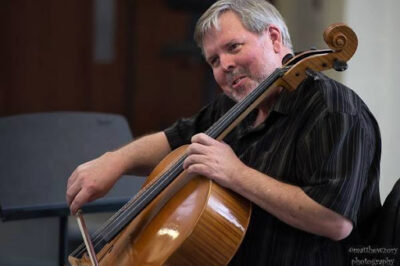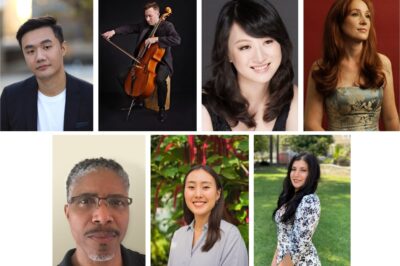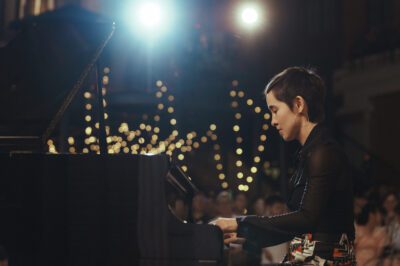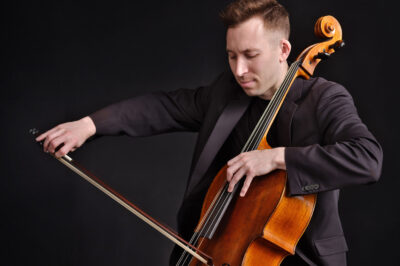Dr. Ernest Harrison | Cantare Chamber Singers
Last September, PCM was excited to introduce Cantare Chamber Singers, an amateur, audition-based adult choir for mixed voices (soprano, alto, tenor, bass). The ensemble was led by Dr. Ernest Harrison, the recently-appointed music director of the Gay Man’s Chorus of Los Angeles, and featured repertoire that is varied with a core of serious choral works. Cantare was scheduled to present two performances last year, presenting one in December and cancelling the other due to Covid-19.
When the campus closed in March, Cantare was suspended for the remainder of the school year. Now, fifteen members strong, they are back together and rehearsing online. We recently caught up with Dr. Harrison to ask him what we can look forward to hearing from Cantare this fall.
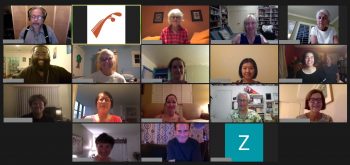
PCM: How was the first rehearsal on September 3?
EH: All in all I think it went well. I had trouble with time management because 90 minutes in front of an ensemble in person and 90 minutes in front of a screen are two entirely different measurements of time. But I got the members moving, singing, and out of their comfort zone.
The biggest issue with singing at home in front of a screen is that corporate music making, which is quite an external process, is substituted for the highly internal experience of singing at home alone. When you sing in the car or in the shower you sing to your inner self without giving regard to dynamics, expression, tone, etc. When teaching virtual ensembles you have to be constantly mindful to practice proper dynamics and performance technique while you rehearse because now, more so than ever, the students are going to do exactly what they have practiced.
PCM: What do you consider to be the biggest challenge(s) to leading a choir virtually?
EH: The biggest challenge for me as a conductor has been to find the balance between engaging the singers, teaching them something of value, holding their attention through a virtual medium, and simply figuring out how to do any of this.
I teach through zoom for four different jobs and I have found the consistent through line to be “you can’t prepare for everything.” For instance, this week, about thirty seconds after Eugene and Mary (our administrative team members) left our class call, my audio went out completely and I had to figure that out on the spot. This is one of the many situations of life that you have to greet with patience and a laugh. I am grateful to have flexible, patient, and eager choristers who are excited about making music.
PCM: What will you be focusing on this fall?
EH: 1.) focus on the individual’s vocal growth through solid vocal pedagogy and techniques; 2.) pitch memory and aural independence – i.e. developing the tools to become secure in how to find and maintain the pitch without corporate assistance; and 3.) breathing and posture – i.e how the body affects vocal production
PCM: What will fall rehearsals look like for Cantare?
EH: Our virtual season differs from our normal seasons in that we have transitioned from a specialized auditioned chamber choral group to a non-auditioned “come-all” choral group. Our approach is structured around a focus on personal vocal growth, learning the basics of musicianship, aural training, reading with your ears and listening with your eyes – i.e. bridging the divide between reading music and learning by rote, and creating an environment where the experienced singer will be able to find fulfillment in the diversity and challenge of our repertoire while the new singer will find an easily accessible, low pressure path to learning how to sing.
Singers are provided with practice tracks and in some cases track of their own voice part in order to practice at home. During class, we spend time working on each individual’s parts so that they feel comfortable singing and recording at home. More than anything, we are trying to create a corporate sensation in our music making even though we are all essentially at home in front of our computer screens. Our success is based on reaching the hearts of the people again beginning October 13th.
PCM: Why do you feel it’s important for Cantare to happen virtually?
EH: Last year was our first year and even though our first concert was quite successful and awarded us a great deal of momentum, it is easy to lose motivation in times such as these. Furthermore, virtual rehearsals present us with a unique opportunity to reach singers from across the state who would not have been able to participate with us on a regular basis otherwise.
As I have said to my members several times, my main concern is your health and well being. Yes that means no in person classes, social distancing, etc. but it also means that it is my duty to find ways to keep us singing in order to preserve our mental and spiritual health as well.
PCM: What are you most excited about for the coming school year?
EH: Figuring out how to successfully rehearse virtually. I believe quite strongly that many choral programs will adapt much of what we are learning during quarantine to our regular programs in the future. Think of how awesome it would be to have a virtual choir project every season that would include membership from across the state, region, or even country. Much of what we are learning now will positively shape how we recruit, perform outreach in our community, and develop continued learning opportunities for students outside of our normal realm of influence.
PCM: Anything else you want to share with us?
EH: If you know anyone looking for an emotional outlet, please send them our way. We are open for recruitment through next week and again beginning October 13th.
